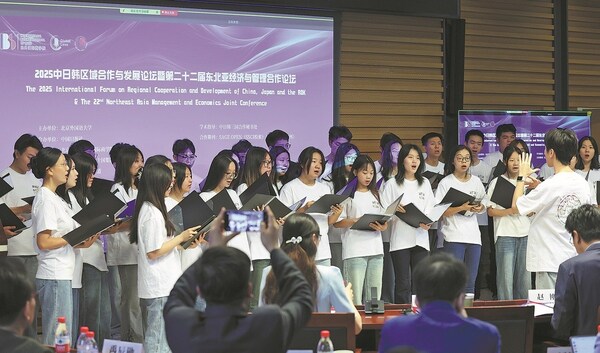Top Stories
East Asian Nations Urged to Unite for Economic Resilience

During the 2025 International Forum on Regional Cooperation and Development held in Beijing on September 21, participants emphasized the need for China, Japan, and the Republic of Korea to enhance cooperation to drive economic growth and resilience amid increasing global uncertainties. The forum highlighted the importance of collaboration in the face of rising trade protectionism and other challenges.
Call for Collaborative Action
Lee Hee-sup, secretary-general of the Trilateral Cooperation Secretariat, addressed the assembly, stating that the current landscape of challenges, including climate change, advancements in artificial intelligence, and demographic changes, are reshaping industries across the region. “Exclusive competition leads to shared decline, while cooperation with a sense of common destiny opens the way to shared prosperity,” he remarked.
A study presented during the event indicated that the industrial cooperation among these three East Asian nations could significantly enhance regional resilience. The research noted that Japan’s materials, South Korea’s semiconductor sector, and China’s manufacturing capabilities are highly complementary, forming a robust economic network. Together, these nations represent nearly a quarter of the world’s gross domestic product (GDP) and account for one-fifth of global trade.
Strengthening Economic Ties
The Regional Comprehensive Economic Partnership has already improved connectivity and reduced tariffs within the region. Yet, experts argue that a trilateral free trade agreement would further solidify supply chains, providing East Asia with a more substantial role in shaping global economic rules. If these countries unite their strengths, they could potentially set 45 percent of global AI standards and contribute to one-third of clean energy technologies by 2030, according to Lee.
The call for shared prosperity found support from Zhao Gang, vice-president of Beijing Foreign Studies University. He emphasized that the cooperation among these nations positions them as one of the most dynamic economic regions globally. “As neighbors, their cooperation has the potential to reshape the global economic order,” he stated.
Despite the hurdles in advancing collaboration in cutting-edge technology, a case study presented at the forum underscored the necessity of joint efforts. Jun Youn Kim, chief representative of the Korea-China Science and Technology Cooperation Center, remarked, “By working together, we can reduce the costs associated with exploring optimal combinations and share successful outcomes. Moreover, collaboration is crucial for surviving the uncertainties of technological innovation.”
Osamu Onodera, director of the Beijing Representative Office at the Japan External Trade Organization, remarked that this trilateral initiative aligns with a broader vision for an “open, dynamic, resilient and peaceful community” in the Asia-Pacific region.
The forum, co-hosted by Beijing Foreign Studies University and China Daily, gathered experts and thought leaders from China, Japan, and South Korea. Their discussions underscored the urgency of cooperation while acknowledging the significant challenges that lie ahead as these nations navigate a turbulent global economy.
-

 World5 months ago
World5 months agoSouth Korea’s Foreign Minister Cho Hyun to Visit China This Week
-

 Business5 months ago
Business5 months agoStarling Bank Plans Secondary Share Sale, Targeting $5.4 Billion Valuation
-

 Top Stories5 months ago
Top Stories5 months agoMunsang College Celebrates 100 Years with Grand Ceremony
-

 World5 months ago
World5 months agoPAS Aims to Expand Parliamentary Influence in Upcoming Election
-

 Business7 months ago
Business7 months agoKenvue Dismisses CEO Thibaut Mongon as Strategic Review Advances
-

 Lifestyle6 months ago
Lifestyle6 months agoHumanism Camp Engages 250 Youths in Summer Fest 2025
-

 Sports6 months ago
Sports6 months agoDe Minaur Triumphs at Washington Open After Thrilling Comeback
-

 Sports7 months ago
Sports7 months agoTupou and Daugunu Join First Nations Squad for Lions Clash
-

 Top Stories7 months ago
Top Stories7 months agoColombian Senator Miguel Uribe Shows Signs of Recovery After Attack
-

 World7 months ago
World7 months agoASEAN Gears Up for Historic Joint Meeting of Foreign and Economic Ministers
-

 Health6 months ago
Health6 months agoNew Study Challenges Assumptions About Aging and Inflammation
-

 Business7 months ago
Business7 months agoOil Prices Surge Following New EU Sanctions on Russia









